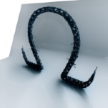But you dont really care 'bout voltage, do ya?
It goes like this, on the the 25th. A minor shock? No. Death madeshift.
The baffled men are meeting now their maker.
Hallelujah, Hallelujah,
Hallelujah, Hallelujah!
Also known as a “nope rope”
I thought that was a snake…
Those are danger noodles
What what’s a safe danger noodle then? I thought those were nope ropes.
I wouldn’t plug both ends of a snake into the mains either.
We call them a Deadman’s cable up here, and sadly they’re still quite frequently used in the northern rural areas because it costs almost $2,000 to have a dedicated bypass switch installed(generator hookup) so nobody does it, they just throw the Main and hope they don’t put too much stress on the internal lines.
Is it legal? Hell no but they do it anyway
I did this.
Is it stupid? Yes. Did it work? Also yes. For the amount of time that we’d have power out, it was just way to easy to throw a breaker and connect it like this just to keep a small heater and a light running. If I had the money at the time I would have loved battery backup/ bypass but this cost $2 and an old cord.Especially considering that having a functional stove nowadays skyrockets your insurance. A lot of people used to use wood stoves as the backup heat source if the power went out, we still have one ourselves however it’s “non-functional” , it probably is to be honest it hasn’t been ran for a few years now but it was going to Skyrocket the insurance if we had it listed as a functional Appliance
The lord chord
I thought this was an anti homosexuality meme until I read the top comment.
I’ve got to stop using Lemmy. It is changing me…
I too have developed into a very politically correct person with lemmy, I kinda miss being able to make gay jokes
I guess you’re too straight edge for that.
God, straight edge is so old I literally had to get a consultation to understand the insult

Gay jokes as in just jokes making fun of gay people? Why do you miss making that? I can just tell you that especially when I was a gay kid, I would have wished no-one would make such.
That’s pretty gay.
/shrug at least I’m not an asshole purposely hurting other people
I know so many gay and racist jokes as a result of my upbringing. I’ve only been able to convert a few. There’s alao a few I can still tell to the right crowd.
They very much do exist, though. Often used sketchily with generators.
How do you non-sketchily feed a generator’s power into your home?
You get a qualified tradesperson to wire it properly into your electrical distribution.
Technical details and the social contract mandate that your generator is never connected to the main power grid. The generator should be wired to an enclosed AC transfer switch. This switch will connect either the generator or the main grid to your home, but never both.
Some detail: If the generator is wired to the main grid it can prevent restoration of main grid power. While an AC transfer switch will perform the task, many jurisdictions mandate additional safety precautions (which can be quite expensive).
It can also kill a lineman working on the power lines outside your house, thinking they’re not energized.
It could. But, there’s more layers to this swiss cheese model of safety. For example, the lineman’s procedure is to ground out, then isolate, then test. They’d need to skip both ground out and test to be electrocuted by an asshole with a generator.
There are electrical panel accessories that automatically isolate the house
The proper way of doing it is using what’s called a generator bypass switch, basically it’s a physical switch that runs before your fuse box, and it makes it impossible to have both the main and the generator being fed at the same time, so you can either have the main on or you could have the generator on. This prevents the electricity from your generator back feeding into the line and killing a line worker trying to restore power.
Sadly, like the other comments have said people tend to use these male to male cables in order to not have to pay the $2,000 to install the switch and instead choose to just turn the main breaker off and plug that cable in. But since it’s possible to have both the main and the generator on it’s not legal because if you forgot to throw the Main or if you did it incorrectly you could be putting workers at risk
Even disregarding the safety risk of using such a cable, not having a dedicated switch installed also means that you’re plugging your generator into usually an outside socket of the house, and those power lines aren’t usually meant to have a high load so you risk creating a fire from over straining the line as well
The real way is a generator inlet, which is a male plug that’s interlocked with the main. So the cord ends up being a normal male/female cord
Lol this dude never turned hydro into diesel! Look at this guy!
Modern inverters do this somewhat safely by sensing the phase before outputting power.
Of course, you can’t tell just by looking, so I still would steer clear of the whole thing on principle.
I’m not American, Christmas lights aren’t a thing here like they’re in the US, can someone explain?
Strand of exterior lights, one end male plug one female. Idiots start to mount the lights with the female end near their outlet. Get done, become confused, go to store for male to male cord to plug into female end.
The female end is for chaining multiple strands, not for supplying power (directly) from the power socket.
The power can go through the female end just fine, that’s not the problem. The problem is people plug this “suicide cable” into the wall first, thus creating a 120v taser of sorts. Like someone else in this thread said, the only problem from cables like that is people tend to try to backfeed energy into the system with a generator or solar panels. Boom.
Also, at the end of the chain there is a male terminal exposed with live current. Could cause a fire I guess.
So is the problem solved by not plugging it into a powered wall plug? Just like… flick the switch off, like you would a light switch before changing a bulb?
Most American outlets aren’t switched. They can be but most aren’t. If you’re really paranoid you can throw the breaker at the panel.
Yes, but if someone trips over the cord there is a 50% chance the wrong side comes unplugged and potentially kills them, hence why they don’t make these cords
The solution is pulling down your Christmas lights and hanging them back up the right way.
Isnt having an open end really dangerous?
Every Christmas light string I have seen has had a small fuse inside of the plug, so even if you managed to get a female plug full of water or something and somehow manage to get shocked before a breaker trips in the outlet, you’re probably just going to blow the fuse.
You cam cover them with electric tape or put a cover on them. It’s nobmore dangerous than your home’s exterior outlets though.
Homes exterior outlets??? It might be europe but we dont have neither of those seemingly pretty dangerous things.
Gfci outlets are pretty cool technology. They make getting electrocuted impossible as long they are installed correctly.
…in europe. From what i heard america doesnt really have them.
Considering they are required by code to have them anywhere there is water. America does have them.
I’m going to assume you are English, since they seem to have extreme fear of electric shocks. But there is never any issue with exterior outlets. 99% of them have covers like this and are no nore dangerous that light switches on a patio or in your bathroom.
The places where i lived for longer times are hungary, sweden and ireland. Ireland has the same plug as the uk, and in hungary and sweden its the general eu plug. While the plug you linked does seem mostly safe, i think its a good thing that the uk takes electrical safety seriously. My main problem with the female plug is its a christmas tree that can catch on fire and i dont think an exposed wire near it is a good idea. If the cover is required in some way to complete the circuit then i have no problem with it. Thats good design but the sad thing is most of times they skip the good design part.
Thr cover doesn’t complete the circuit, it just prevents debris getting into the socket. An extension cord doesn’t have a cover on the female end and it is completely safe, just like an outlet in a bathroom or a surge protector.
deleted by creator
Aaah, gotcha! Thank you!
Their lights usually have a plug on one end and a socket on the other. Ppl put them around the exterior of their hoses, then realise they did it the wrong way, and the socket end is near the outlet they wanted to plug them in.
Or they mounted two strands of lights, and where they meet up it’s either 2 plugs or two sockets accidentally.
A strand of christmas lights resembles an extension cord, but they tend to be made of smaller gauge wire and obviously have little sockets for tiny light bulbs spaced along them. They typically have 2-prong male plug on one end, often with a 2-prong female pass through on the back so you could plug more than one strand into the same receptacle, and they usually end in a female plug so they can be daisy chained.
Sometimes, when installing them on a house or something, the person installing them may not pay attention to which direction is which, and end up installing them so that the female-only end is near where they intended to plug them in. So instead of pulling them down, or running a long extension cord, they go to the hardware store looking for a male-to-male plug adapter.
Power plugs and sockets are gendered for a very good reason; the female receptacle keeps the energized contacts protected inside, and the male plug’s contacts should only be energized when plugged in and their outer shells protect them. A male-to-male cable when one end is plugged in and the other is free now has exposed mains current just waving around in the open air ready to kill someone. And, on a smaller note with christmas lights, they usually have a fuse built into the plug, and plugging them in backwards bypasses this for at least the first strand, so it’s technically 102.7% unsafe to do this.
The other thing a male-to-male adapter or cable is sometimes used for is to attach a portable generator to your home’s electrical system by just plugging it into an outlet, especially during a power failure. They do make what are essentially special male receptacles I think mainly for the RV industry for attaching generators like that, most houses won’t have these. Plugging it into a normal wall socket will actually work, but 1. you have bypassed the breaker panel, so the breakers no longer provide over-current protection. You could overheat the wires in the walls and burn down the house. 2. there’s a possibility that you’re feeding electricity to the entire house through the breaker box and even out to the transformer, which means the lines could be energized for linemen working on them. Throwing the main breaker might prevent that? They make switching gear designed for buildings with their own backup generators that can either manually or automatically sever their connection to the grid when on internal power, but again a doofus trying to make one of these cables probably doesn’t have one of those.
Outstanding, thank you for this
/But hardware stores don’t want to sell it tooooo youuu…/
/…tooo ya…/
Practical IQ test with binary result (“pass”/“fail”).
My dumbass made one by accident. Plugged it in, walked to the other end, picked it up my saw, “Shit. How did I throw the wrong end out here?” Whatever, we’ve all strung the extension cord backwards before. Here come the IQ test.
Walked to the other end of the cord, yanked it and threw that end back out into yard, plugged it in. Went back to my saw, “Oh for fuck’s sake!”
https://www.youtube.com/watch?v=H-4mvK2FW78
Plugging the cord in the same outlet isn’t dangerous itself, but the prongs will be live on the end that’s not plugged in, I’d suggest not touching them. Where it IS dangerous is when people try to use them with a generator to back feed their panel. Don’t do that.
It’s also good to backfeed a generator into an outlet
No problem.
I got these baddies

Memories. Me and my friends used to zap eachother with these before social media made everyone into cowards
Ok boomer
All I got to zap was myself.
You gotta lick it after you plug it in so you know it’s working.
Teehee, it tingles!
Just use 2 paper clips and some duct tape, problem solved!
You can also use them to test the voltage, similar to testing a 9v battery.
aaaaaahhhhhhhhhhh lic-
i guess if someone’s putting up their lights backwards, then it makes sense that that person also thinks it’s less work to drive to the hardware store and buy a non-existent extension cord than it is to just redo the lights
I’ve used a suicide cord before in some rare instances. When I was finished I immediately took it apart.


















